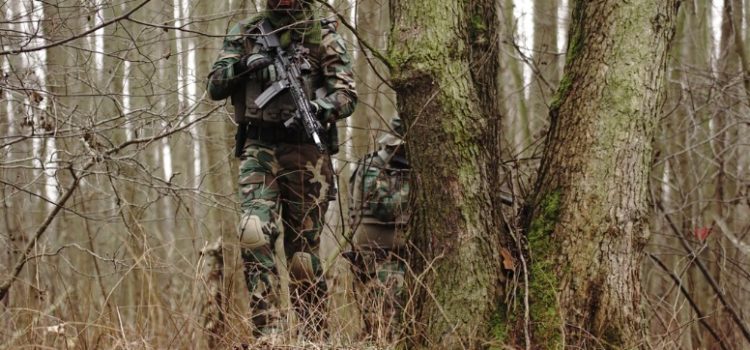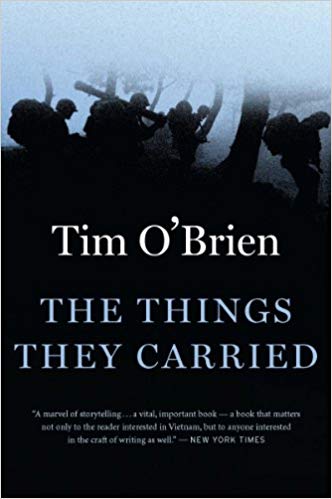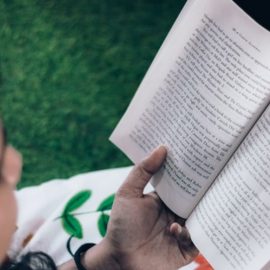

This article is an excerpt from the Shortform summary of "The Things They Carried" by Tim O'Brien. Shortform has the world's best summaries of books you should be reading.
Like this article? Sign up for a free trial here .
Who is Kiowa in The Things They Carried? What are the defining moments for his character?
Kiowa is a Native American soldier in Alpha Company, a unit of the U.S. Army in the Vietnam War, in The Things They Carried. Kiowa is deeply religious and scrupulous, which is atypical for the company.
We’ll cover the most important scenes involving Kiowa in The Things They Carried.
Kiowa in The Things They Carried
Among the men of Alpha Company, only one soldier in The Things They Carried, Kiowa, a Native American who carries his New Testament on his person at all times, shows any introspection. When death strikes the company, he is always the one who encourages his comrades to talk about their experiences rather than submerge them in acts of violence or displays of emotional cruelty. Seeing Cross’s despair, Kiowa wishes to himself that he could feel for Lavender as Cross does. But instead, all he can think about is the sound of Lavender’s body hitting the ground.
In The Things They Carried, Kiowa teaches a rain dance to Rat Kiley and Dave Jensen.
One day, the company discovered a pagoda where they met two monks. The deeply religious and (atypically for Alpha Company) scrupulous Kiowa was uneasy about going in, believing that it was sacrilegious for the men to enter such a holy place. Still, the men camped out there for a week, as the monks waited on the soldiers. They took a special liking to Dobbins, dubbing him “Soldier Jesus.” The serenity of the place and the kindness of the monks even inspired Dobbins to consider leading a spiritual life after the war.
Kiowa’s Comfort
O’Brien vividly recalls the VC soldier he killed. He remains deeply traumatized by the experience, haunted by it even decades later.
Azar, in his typically callous manner, described the body as being like “Shredded fuckin’ Wheat.” In The Things They Carried, Kiowa, however, tried to comfort O’Brien about what he’d done, telling O’Brien that he had had no choice in the matter. It was war and it could have just as easily been O’Brien lying dead. Kiowa reminded O’Brien of the fatalistic circumstances of war—the man would likely have been killed anyway, if not by O’Brien, then by someone else. Critically, O’Brien remembers Kiowa urging him to talk about his feelings instead of suppressing them. In The Things They Carried, Kiowa was encouraging O’Brien to fulfill his role as a storyteller.
Later, Norman Bowker pictures telling his former girlfriend about coming under heavy mortar fire in this awful place, how the mud and human waste oozed and boiled up into his face and even into his mouth. And he remembers seeing Kiowa in The Things They Carried sinking into the vile ooze, and being unable to save him. He remembers watching Kiowa drowning (it’s unclear if he was also hit by gunfire) and trying desperately to save him by grabbing his boot and attempting to pull him out. But he was unable to rescue his comrade.
Blame
O’Brien reveals why he was unable to write about Kiowa’s death before The Things They Carried. It is because he feels that he was responsible, not Bowker. Right before the attack, O’Brien and Kiowa had been talking together in the field, sharing stories from back home. O’Brien had shown Kiowa a picture of his girlfriend Billie and used a flashlight to illuminate the photograph. The light from the flashlight gave away the company’s position to the enemy, causing the firefight which led to Kiowa’s death. Naturally, O’Brien is haunted because he believes he is responsible for the gruesome death of his friend.
The next day, the men begin the mournful search for Kiowa’s body in the sewage field. Their boots sink into the filth as they wade through, trying to cover as much ground as they can. Eventually in The Things They Carried, they find Kiowa’s pack, containing a pair of moccasins and an illustrated New Testament.
Later, they find Kiowa’s submerged body, which requires several men to dig out from the muck. Finding the body causes the men to reflect on the random nature of life and death in Vietnam. What happened to Kiowa could just as easily have happened to any of them. Even Azar is driven to a moment of introspection after the incident. While earlier in the day he had been cracking jokes about Kiowa being “buried in shit,” he later tells his comrades, “Those dumb jokes—I didn’t mean anything.” After finding the pack, Mitchell Sanders becomes enraged at what he perceives as Lieutenant Cross’ incompetent decision to encamp the company in a sewage field, arguing that he ought to have exercised better field discretion and found a safer place for his men to spend the night.
Cross, meanwhile, is stricken with guilt at losing another man under his command. He knows that he ignored the warnings from the villagers (and from Sanders) to avoid that field. It is his mistake, he believes, that killed Kiowa. He silently laments the loss of Kiowa, remembering him as an upstanding young man who deserved far better than the fate he met. In writing to Kiowa’s father, Cross is unable to tell him the true awful and disgusting circumstances of his son’s death.
Cross observes to himself that a death always leads to an assessment of responsibility, a search for who or what is to blame. It could get very abstract and disconnected from the proximate events in the field—you could blame the politicians and generals who started the war, the American voting public, God, the military-industrial complex, or any number of other “responsible” parties. But in the field, the larger sociopolitical or theological context doesn’t matter: a single stupid decision (like Cross camping in the sewage field or O’Brien switching on his flashlight) could lead to a man getting killed. In The Things They Carried, Kiowa’s death is simultaneously no one’s fault and everyone’s.
In what he hopes is a final act of closure, O’Brien returns Kiowa’s moccasins to the field, letting them sink into the mud. Although a gifted writer, words fail him in this instant. He is unable to come up with anything poignant or meaningful to say during this moment of remembrance. He simply says, “Well, there it is,” as he looks back at the field one last time. He feels that he has been buried in that field ever since that terrible night, but that now, perhaps, he has finally found his way out.
———End of Preview———

Like what you just read? Read the rest of the world's best summary of "The Things They Carried" at Shortform . Learn the book's critical concepts in 20 minutes or less .
Here's what you'll find in our full The Things They Carried summary :
- What the Vietnam War was like for soldiers on the ground
- How Vietnam soldiers dealth with the psychological stress of death around them
- How fictional stories can be truer than the truth






